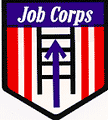|
Job Corps course title: Auto Body Refinishing. In this course students
learn both auto body repair and painting theory and techniques through
practical experience. On the job, these auto body repairers are skilled
craft workers who repair vehicle parts damaged by collision, rust or other
causes. Although they are usually qualified to repair many types of
vehicles, most work on automobiles and trucks. Some specialize in
repairing other types of vehicles such as buses or truck trailers.
Automobile-Body Repairers usually work indoors. Most shops are well
ventilated, but are often dusty. Repairers often work in cramped or
awkward positions and, at times, their work may be strenuous. Following
the proper safety measures is necessary to avoid cuts from ragged metal
parts, burns from torches, and injuries from power tools.
Repairers are customarily required to own a set of hand tools. Power tools are generally furnished by the employer. Investments in hand tools can amount to $1,500 or more. In California, the proportion of
union membership tends to vary, depending on the employer and geographic area. Those employed by large automobile dealers, trucking companies and bus lines are nearly all covered by union contracts. Many small independent repair shops are nonunion.
:
In small shops, there are few opportunities for advancement. In larger shops, repairers with several years of experience may advance to supervisor or shop manager. Many eventually open their own shop.
Job growth for repairers will be about the same as the average for all occupations in California. The increasing number of lighter vehicles that are more difficult to repair and prone to greater damage will help boost the demand for repairers. Additionally, as the number of motor vehicles in operation grows with the
state's population, the number of damaged vehicles will also increase. The automotive repair business is not particularly sensitive to economic downturns and experienced repairers are seldom laid off. Some areas throughout the State report a shortage of qualified workers, although a surplus of inexperienced trade school graduates exists. The demand for experienced workers is expected to continue.
| California |
Median
$12.82 |
Mid-Range 1998
(25th to 75th percentile) $10.52-$18.18 |
To enroll in this San Jose Job Corps Course: 510 TABE Math/Reading score, OR GED/HS diploma.
Job specific skills: In repairing
a damaged vehicle, body and fender repairers may perform a number of
different tasks. They remove dents by hammering them out with special
metal-working tools and then smoothing the hammered area by filing,
grinding or sanding. They use plastic or solder to fill dents that cannot
be worked out of the metal. When necessary, they align bodies, straighten
frames, install window glass and windshields and remove and install body
parts. They weld breaks in body metal and file them smooth to conform to
adjacent areas. Badly damaged body areas may be removed with a cutting
torch and are placement fitted and welded into place. The welds are then
ground down so that it doesn't show, using power grinders and other tools;
the newly fitted panel is then made to match nearby surfaces. They also
repair fiber glass body parts, install new upholstery and may sand and
mask (tape and cover) body areas to be painted.
The repair of each damaged vehicle
presents a different problem; repairers must be able to determine the
appropriate repair methods. In this way, the work offers variety. These
craft workers must have a broad knowledge of vehicle construction and
repair techniques. Repairers usually work by themselves with only general
directions from their supervisors. Supervisors generally determine which
parts are to be repaired or replaced and the amount of time the job should
take. In some shops, repairers may be assisted by helpers.
Back to Top
|
|



